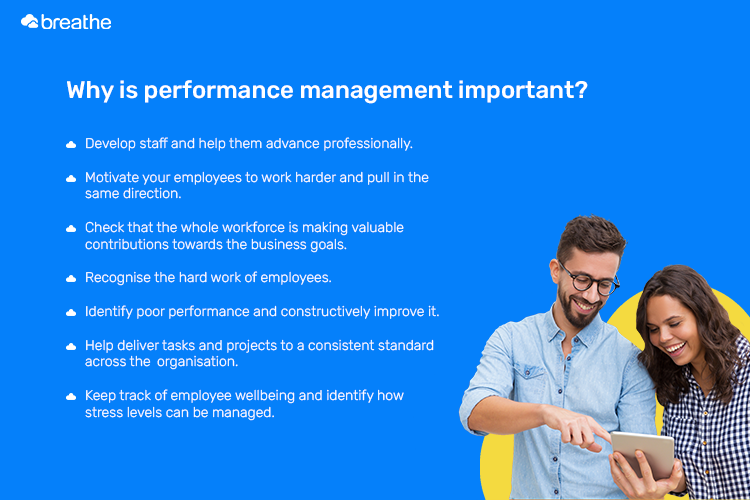Performance management plays a crucial role in the workplace. It helps employees improve and succeed.
Understanding its importance can boost morale and productivity. Performance management is not just about annual reviews. It’s a continuous process that guides employees toward achieving their goals. It provides clear expectations and feedback, allowing employees to understand their strengths and areas for improvement.
This system benefits both the employee and the organization by aligning individual performance with company objectives. When employees know what is expected, they can focus on what truly matters. This clarity leads to increased motivation and job satisfaction. Moreover, consistent feedback helps in personal and professional growth. In the end, effective performance management creates a supportive environment where employees can thrive and contribute meaningfully to the organization’s success.
Table of Contents
ToggleBenefits of Performance Management

Credit: www.breathehr.com
Improving employee motivation and productivity through performance management is crucial. Regular feedback encourages skill development and aligns personal goals with company objectives. Employees feel valued and recognized, fostering a positive workplace environment.
Performance management is more than just a corporate buzzword—it’s a vital tool for driving employee success. When done right, it offers numerous benefits that can transform the workplace into a hub of productivity and satisfaction. Whether you’re an employee or an employer, understanding these benefits can help you harness the full potential of your team.
Enhancing Employee Skills
Performance management is like a roadmap for skill development. It provides clear goals and feedback, helping employees identify areas for improvement. Imagine being an artist constantly refining your craft. Regular assessments and constructive criticism can sharpen your skills, making you more efficient and competent in your role. You might recall a time when your supervisor highlighted a skill gap. The feedback, while initially daunting, led you to seek training and mentorship. You emerged more skilled and valuable to your team, proving the power of targeted skill enhancement.
Boosting Morale and Motivation
Have you ever felt empowered after receiving recognition for your hard work? Performance management often includes acknowledging achievements, which can significantly boost morale. When employees feel valued, their motivation skyrockets, resulting in higher productivity and engagement. Consider the impact of a simple “job well done” from your boss. It’s not just words—it’s validation. This recognition can transform your approach to work, sparking a renewed enthusiasm and drive. Are you receiving enough recognition for your efforts? If not, it might be time to discuss performance management strategies with your supervisor. Performance management isn’t just a managerial tool; it’s a pathway to personal and professional growth. How can you apply these insights to enhance your own work experience?
Goal Setting and Achievement
Goal setting is crucial for employee performance management. It guides employees and aligns their efforts with company objectives. Achieving goals boosts motivation and improves productivity. Employees know what is expected and strive to meet those expectations. This clarity helps in achieving personal and organizational success.
Aligning Personal and Organizational Goals
Personal goals must align with organizational goals for maximum impact. This alignment ensures that employees contribute to the company’s success. It helps employees see the bigger picture. They understand how their work fits into the company’s vision. This understanding increases engagement and commitment.
Tracking Progress and Success
Tracking progress is vital in performance management. It helps employees see their achievements and areas for improvement. Regular check-ins provide feedback and guidance. Employees feel supported and motivated to reach their goals. Success tracking celebrates achievements and encourages continuous growth.
Feedback and Communication
Feedback and communication are critical elements of performance management that directly impact an employee’s growth and success. When feedback is clear and communication is open, employees know exactly where they stand and how they can improve. This mutual exchange builds trust and fosters a supportive work environment, driving both individual and organizational success.
Constructive Criticism
Constructive criticism is more than just pointing out mistakes; it’s about guiding employees toward improvement. It’s essential to highlight both strengths and areas for development. This balance ensures that employees feel valued and motivated to grow.
Imagine receiving feedback that not only identifies a problem but also suggests actionable steps to overcome it. It’s like having a coach who genuinely wants you to succeed. How can you incorporate this approach into your feedback sessions?
Open Dialogue Opportunities
An open dialogue is a two-way street where employees feel comfortable sharing their thoughts and concerns. This transparency encourages honest conversations that can lead to innovative solutions and improved performance.
Consider setting aside regular times for informal check-ins. These sessions can act as a platform for employees to voice their ideas and challenges. How often do you create space for these valuable exchanges?
Effective feedback and open communication are not just managerial tools—they are essential components of a thriving workplace. By embracing these practices, you empower your employees to reach their full potential.
Career Development Pathways

Credit: technologyadvice.com
Career development pathways play a crucial role in performance management. They guide employees in achieving their professional goals. Employees feel valued when they see a clear path for growth. This boosts their motivation and engagement at work. A well-defined career path helps in retaining top talent. It offers a vision for the future, encouraging employees to stay committed.
Identifying Growth Opportunities
Recognizing growth opportunities is key to career development. Employees need to understand where they can advance. Managers should identify roles that match employee skills. This helps in aligning personal goals with organizational needs. Transparent communication about available positions boosts employee morale. It creates a culture of trust and ambition. Employees feel empowered to pursue new challenges.
Skill Development Plans
Skill development plans are essential for career growth. They provide a structured approach to learning. Employees must know which skills are needed for advancement. Managers can create personalized development plans. These plans should be based on individual strengths and areas for improvement. Regular training sessions enhance employee capabilities. Feedback and assessments help in tracking progress.
Recognition and Rewards
Performance management boosts employee motivation by recognizing achievements and offering rewards. It helps employees understand expectations and goals. This process encourages continuous improvement and job satisfaction.
In the dynamic world of performance management, recognition and rewards play a crucial role in motivating employees. They are not just about handing out bonuses or praise; they are about valuing contributions and encouraging excellence. When employees feel recognized, they are more likely to be engaged, productive, and committed to their work. But how can organizations effectively implement recognition and rewards that truly resonate with their teams?
Acknowledging Achievements
Celebrating achievements is more than a pat on the back. It’s about creating a culture where accomplishments are noticed and appreciated. Imagine completing a challenging project, and your manager personally congratulates you during a team meeting. This simple act can significantly boost morale and make you feel valued. Acknowledging achievements can take many forms. Some companies use platforms where peers can recognize each other’s hard work, fostering a supportive environment. Others might have monthly awards to highlight exceptional performances. What does your company do to show appreciation? Small gestures, like a handwritten note or a shout-out in a newsletter, can make a big difference.
Incentives for Excellence
Rewards provide tangible motivation to strive for excellence. Knowing that your hard work could lead to a bonus, a promotion, or even extra vacation days can be a powerful incentive. But it’s important that these rewards align with what employees truly value. Consider your own workplace: are the rewards meaningful to you? Some employees might appreciate monetary bonuses, while others prefer flexible work hours or professional development opportunities. Tailoring rewards to individual preferences can enhance their effectiveness. Have you ever worked harder because you knew there was a reward at the end? Think about what incentives would make you go the extra mile. Whether it’s a team lunch, a gift card, or a day off, the right reward can spark motivation and drive performance. Ultimately, recognition and rewards are about making employees feel seen and valued. They can transform the workplace into a more positive and productive environment. How does your organization recognize and reward its employees?
Employee Engagement
Employee engagement is crucial for a thriving workplace. Engaged employees show dedication. Their productivity is higher. They contribute positively to company culture. Performance management is a key factor in boosting engagement. It provides clear goals and feedback. This clarity motivates employees. They understand their role better. Let’s explore how performance management enhances employee engagement.
Increasing Job Satisfaction
Performance management helps employees feel valued. They receive constructive feedback. Their efforts are recognized. This boosts their job satisfaction. Employees know what is expected of them. It reduces stress and confusion. When they achieve goals, they feel accomplished. This satisfaction leads to higher engagement. Happy employees stay longer with the company.
Fostering a Collaborative Environment
Performance management encourages teamwork. Employees collaborate to meet objectives. They share ideas and strategies. This fosters a sense of belonging. Team goals create a unified purpose. Employees support each other. They celebrate collective achievements. Collaboration improves communication. It builds trust among team members. A collaborative environment enhances overall engagement.
Performance Improvement Strategies
Performance improvement strategies play a key role in employee growth. They help address shortcomings and enhance skills. With effective strategies, organizations can boost productivity. Employees gain confidence, knowing they can meet goals. Let’s explore some useful strategies.
Addressing Performance Gaps
Identifying performance gaps is crucial. It highlights areas needing improvement. Managers should observe employees regularly. Feedback sessions can reveal obstacles. Honest conversations help pinpoint weaknesses. Together, employees and managers set improvement targets. Clear objectives guide progress. Monitoring results ensures success.
Implementing Training Programs
Training programs are effective tools for skill enhancement. They offer structured learning opportunities. Workshops can cover various topics. Employees learn new techniques. Online courses provide flexibility. Training sessions boost morale. Employees feel valued and supported. Regular training keeps skills sharp. It prepares employees for future challenges.

Credit: www.profit.co
Impact on Organizational Success
Performance management guides employees toward clear goals, enhancing productivity. It fosters growth by offering regular feedback and support. This process aligns individual efforts with organizational objectives, driving success and improving workplace morale.
Performance management plays a crucial role in influencing organizational success. It acts as a bridge between individual employee performance and the company’s overall objectives. When employees are aligned with these goals, the organization is more likely to achieve its desired outcomes. This alignment not only drives business results but also enhances the company culture, creating a more engaged and motivated workforce.
Driving Business Results
Effective performance management is essential for driving business results. By clearly setting expectations and providing regular feedback, employees understand what is needed to contribute to the company’s success. This clarity encourages them to work more efficiently and produce higher-quality outcomes. Imagine a scenario where you know exactly what your boss expects from you every quarter. Wouldn’t that make it easier to focus and deliver? This clear communication channel ensures everyone is rowing in the same direction, leading to improved productivity and business growth. Moreover, performance management allows companies to identify skill gaps and areas for development. This proactive approach ensures that employees have the necessary tools and training to excel, directly impacting the company’s bottom line.
Enhancing Company Culture
Performance management is not just about achieving targets; it significantly enhances company culture. A strong performance management system fosters transparency and trust. Employees feel valued when they receive constructive feedback and recognition for their efforts. Consider a workplace where feedback is a two-way street. You have the opportunity to express your ideas and concerns, and your manager listens and acts upon them. This open dialogue cultivates a positive work environment where employees feel engaged and motivated. A well-implemented performance management system also promotes fairness and accountability. When everyone is held to the same standards, it creates a sense of equality and respect. This, in turn, builds a cohesive team that is committed to the organization’s success. Have you ever wondered how much potential is untapped in your organization due to a lack of effective performance management? By investing in a robust system, companies not only drive results but also create a thriving workplace where employees are eager to contribute their best.
Frequently Asked Questions
What Is the Importance of Performance Management?
Performance management enhances productivity, aligns goals, and improves employee engagement. It provides feedback and identifies skill gaps. Effective management boosts organizational growth and employee satisfaction.
How Do Employees Benefit from Performance Management?
Employees gain clear goals and feedback from performance management. It enhances skill development and career growth. Regular evaluations boost motivation and job satisfaction. Recognition and rewards increase engagement and productivity. Performance management fosters better communication between employees and managers.
What Are the Three Purposes of Performance Management?
Performance management aims to improve employee performance, align organizational goals, and foster professional growth. It enhances productivity and efficiency.
How Does Performance Management Encourage Employee Development?
Performance management sets clear goals, offering feedback and support for skill enhancement. It identifies growth opportunities, motivating employees to improve. Regular evaluations highlight strengths and areas for development, fostering continuous learning. This process encourages proactive career advancement, aligning personal objectives with company goals for mutual success.
Conclusion
Performance management boosts employee growth and satisfaction. It’s essential for progress. Employees know their goals. They understand expectations clearly. Feedback guides them to improve. Motivation stays high with recognition. Challenges become learning opportunities. Performance management shapes a productive workplace. It ensures everyone feels valued.
Employees grow their skills and confidence. Companies thrive when their teams perform well. This approach leads to success. Engaged employees contribute more effectively. Every effort counts towards achieving goals. Performance management isn’t just a process. It’s a vital part of a thriving work environment.
Everyone benefits from improved performance.




